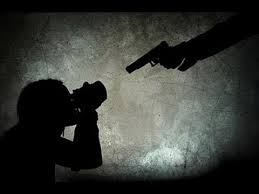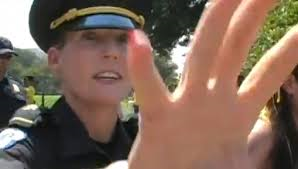Did Illinois just make it a felony to record police?
- by The Lord Humungus
- 10 years ago
- 3 comments

A story has been making the rounds in alternative media about Illinois Senate bill 1342 that just passed in their house and senate. Specifically, the amendment to that bill that deals with eavesdropping/wiretapping and restrictions on recording.
The amendment can be viewed in its entirety here.
The content of this bill has been misunderstood and mischaracterized by several sources within the alternative media, and several well-respected sites have spread the false notion that this bill includes a ban on recording police by ‘making it a felony’.
This is incorrect, and only further confuses people who don’t know whether they are allowed to film police. Just to set the record straight, there is nowhere in the United States where it is illegal to film anyone in public, including police officers, including Illinois. They may tell you to stop. They may even arrest you. But it is not illegal, and higher courts have ruled that there is no expectation of privacy for public officials in public areas1.
I have read all 27 pages of the amendment2 and while there are plenty of changes and re-wording, the restrictions on recording only apply to private communication, and specifically exempts any situation where individuals being recorded do not have a legal expectation of privacy. This bill doesn’t change what was allready legal or illegal with regards to recording police, it just changes the penalties, making them more severe.
The confusion seems to have been started on Dec 5th, 2014 when Illinoispolicy.org published an article titled “Illinois General Assembly revives recording ban”3, in which the author/editor included the tagline “The Illinois General Assembly just passed a bill that would prevent citizens from recording the police.” Which is misleading, as anyone who has actually read the amendment should know.
After the opening, the author does clarifiy througout the rest of the article, and his major complaint with the bill is that citizens won’t know if they are considered to be in public or not when they are filming police. So in his original tagline he apparently meant that the bill would cause people to choose to not film police out of confusion, not that the bill itself would legally prevent them from filming. Jacob Huebert writes,
“The bill says it would only be a crime to record someone where there is a reasonable expectation of privacy, which should mean that recording public encounters with police would not be a crime, and the old law’s fatal constitutional flaw would no longer exist.
But the bill doesn’t really fix the problem. Again, citizens can’t be expected to know for sure precisely which situations give rise to an “expectation of privacy” and which don’t. The Illinois Supreme Court said that police don’t have an expectation of privacy in “public” encounters with citizens, but it did not explain what counts as a “public” encounter. So if this bill becomes law, people who want to be sure to avoid jail time will refrain from recording police at all, and the law will therefore still effectively prevent people from recording police.”
While this is techncally true, this limitation already existed as some states have two-party or all-party consent laws4, meaning that unless you knew all the individual state laws you would already have to be sure you were in public to know you were legally allowed to record. I agree with the author that this can be confusing (especially with headlines like that), but police not understanding the law is a bigger problem right now than the citizens not understanding. Luckily most people seem to understad that they are allowed to record in public- they just get arrested anyway. That will likely continue to be a problem, but it doesn’t have anything to do with this bill.
A few days later more websites picked up on the story, and unfortunately seemed to latch on to the misleading title theme in the Illinois policy article’s headline, but without any similar clarifications in their articles.
on Dec 9th TheFreeThoughtProject.com posted an article titled “Illinois Just Made it a Felony for Its Citizens to Record the Police and the Media is Silent”5.
In this article the author makes the claim that the bill introduces a “new ban on recording”. The article correctly identifies the ridiculousness of more severe penalties if a partcular crime is against police, but doesn’t clarify that it is still 100% legal to film police in public.
Later on Dec 9th The Peaceful Streets Project facebook page linked to the original Illinois Policy article6, but did so with the headline “Breaking- Illinois Passes Bill To Ban Citizens From Recording Police” , which as we know is a misunderstanding of the bill.
I applaud any and all individuals and groups who are working to spread the message of police and government corruption, and try to hold them accountable. But as an alternative to mainstream media it is even more important that we not fall prey to the same sensationalism that necessitated the creation of alternative sources in the first place. The confusion Huebert fears can be a real problem, but it can just as easily be caused by headlines like his as by the laws themselves.
Please post and share this article so that as many people as possible can know that they can still legally hold police accountable by filming them anywhere in the US, even in Illinois.
CITATIONS:
1. http://www.chicagotribune.com/news/local/breaking/chi-supreme-court-rejects-plea-to-prohibit-taping-of-police-20121126-story.html
2. http://www.ilga.gov/legislation/98/SB/PDF/09800SB1342ham006.pdf
3. http://www.illinoispolicy.org/illinois-general-assembly-revives-recording-ban/
4. http://en.wikipedia.org/wiki/Telephone_recording_laws#All-party_consent_states
5. http://thefreethoughtproject.com/illinois-felony-citizens-record-police-media-silent/
6. https://www.facebook.com/PeacefulStreets/posts/822719134454651


Thanks for the info. I saw this on Facebook earlier and I was certain that the wiretapping clause had been struck down by the Illinois Supreme Court. Still, there was a time not very long ago when people were charged with a felony and faced 15 years in prison for filming cops in Illinois.
http://www.zerohedge.com/news/2014-12-27/supreme-court-rules-police-can-violate-4th-amendment-if-they-are-ignorant-law
What is your opinion on this?
It’s insanity, that’s my opinion. Anybody who still says we live in a free country is either a simpleton or just outright lying to themselves and everybody else.